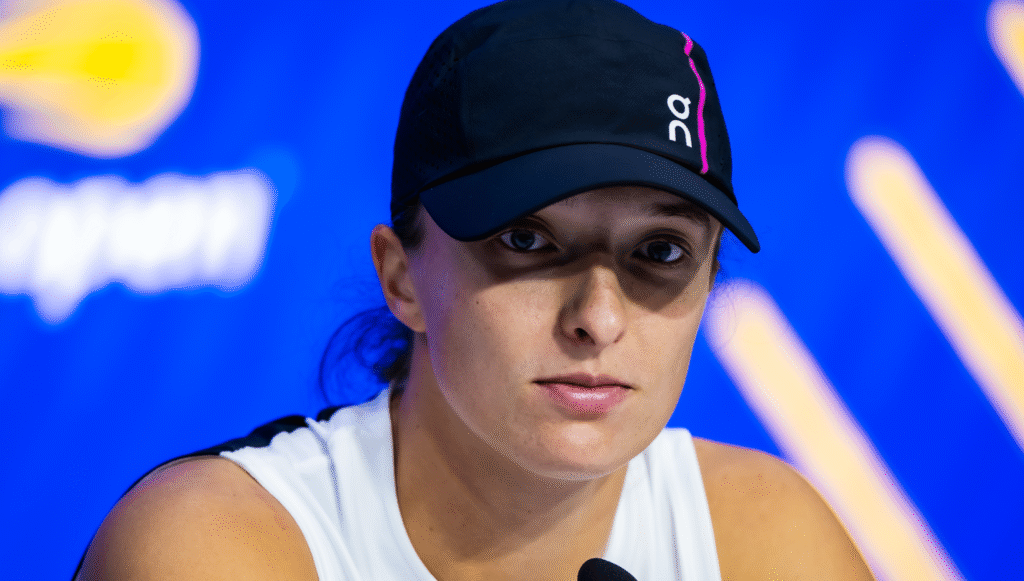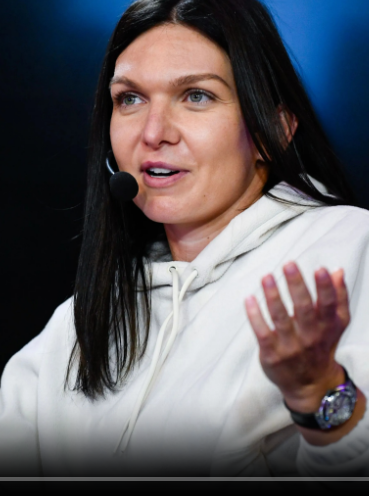
The US Open, at its peak, is a blur of matches, emotions, and storylines. For players, the grind is physical and mental; for reporters, it is no less exhausting, with deadlines colliding with five-set marathons under the unforgiving lights of Flushing Meadows. And sometimes, amid the seriousness, humor cuts through the fatigue.
That was the case on Sunday evening when Iga Swiatek, the 24-year-old Polish star and four-time Grand Slam champion, offered a quip that traveled as quickly as her forehand down the line. Asked by a weary reporter if she ever thought about needing “a mental break” in tense moments, Swiatek smiled, leaned into the microphone, and replied:
“I don’t know about me, but maybe you should take a break.”
The room burst into laughter. The reporter laughed, too. It was a flash of levity that underscored both Swiatek’s sharpness off the court and her ever-growing comfort with the spotlight — a contrast to her often stoic demeanor on it.
From Reserved Champion to Witty Storyteller
When Swiatek first ascended to the No. 1 ranking in 2022, she was seen by many as introverted, intensely private, and clinical in her dominance. She devoured opponents with metronomic precision, rarely allowing a glimpse of her personality outside carefully crafted press statements.
But in the years since, she has grown into her role not just as a player but as a public figure. While she remains soft-spoken, Swiatek has become increasingly playful, even teasing, when the occasion allows. That moment in the press room was not simply about a joke; it was evidence of an athlete coming into her own identity in front of the world.
“She’s much more relaxed now,” said Rennae Stubbs, the ESPN analyst and former doubles champion. “You can see it in the way she interacts with fans, with media, even with opponents. She’s still laser-focused on court, but she’s not afraid to show her humor. That balance makes her even more dangerous as a competitor.”
The Mental Game — Not Just for Matches
The irony of the exchange was not lost on those present. Swiatek has built her career on mental resilience as much as physical dominance. She has spoken candidly about her collaboration with sports psychologist Daria Abramowicz, crediting her with helping her build routines and coping strategies that keep her grounded in the often chaotic world of professional tennis.
“Iga has normalized the idea that mental work is part of being an athlete, not a weakness,” Abramowicz said in an interview earlier this year. “She’s open about the fact that she needs balance — time off from social media, structured rest, and activities away from tennis.”
So when Swiatek flipped the idea of a “mental break” back toward the journalist, it carried more weight than just a laugh line. It was, in its own way, a reminder of the lesson she lives by: everyone, not just athletes, needs to listen to their limits.
A Player Who Rarely Relents
What makes the moment even more notable is that Swiatek herself rarely looks like she needs a break. She has been the picture of stamina this US Open, dismissing opponents with characteristic precision, barely dropping a set en route to the second week. Her relentless baseline game, heavy topspin forehand, and uncanny ability to retrieve balls that seem out of reach have left her rivals gasping for air.
“She plays at a pace that just wears you down,” said Ekaterina Alexandrova, who fell to Swiatek earlier in the week. “You feel like you can’t breathe out there, and she’s just so calm.”
And yet, off court, Swiatek’s calm has transformed into something more expansive: the willingness to joke, to interact, to be playful with the very people chronicling her journey.
A Different Kind of Legacy
The exchange also speaks to the kind of legacy Swiatek is beginning to carve out. Serena Williams dominated with power and presence, Naomi Osaka spoke out boldly on social issues, and Ashleigh Barty embodied balance by stepping away at her peak. Swiatek’s imprint, so far, is one of methodical excellence paired with an openness about the less-visible demands of the sport.
Her humorous quip is unlikely to be remembered as much as her blistering crosscourt winners, but in a subtle way, it adds another dimension to her public image. She is not just the machine-like No. 1 of 2022, nor just the ferocious clay-court queen of Roland Garros. She is also the young woman who, in the middle of New York’s cacophony, can make a room laugh by recognizing the humanity on both sides of the microphone.
Humor as Connection
For the media covering the endless grind of the US Open, Swiatek’s comment resonated. The press room, often filled with tension and repetition, thrives on rare moments of levity. “It was probably the best answer we’ve heard all week,” one veteran reporter said. “It reminded us that this is supposed to be fun, even if it’s intense.”
Humor, especially from athletes, has long served as a bridge between the world of competition and the audience that follows it. Roger Federer was known for his self-deprecating wit, Novak Djokovic for his impressions of fellow players. Swiatek’s sense of humor is quieter, more situational, but no less effective in humanizing her in the eyes of fans and media.

The Bigger Picture
As Swiatek advances deeper into the tournament, the pressure will only grow. The US Open is notoriously unpredictable, its crowds raucous, its late-night sessions legendary. Yet it is precisely in this environment that her composure — and her ability to inject levity — may prove an edge.
“She’s at the point now where she doesn’t just want to win matches,” Stubbs said. “She wants to enjoy the ride, and she wants others to enjoy it, too. That’s why she’s connecting with people in new ways.”
The moment also serves as a reminder of the changing culture in tennis. The sport, once rigid in its formality, has embraced authenticity and openness. Players like Coco Gauff, Frances Tiafoe, and Swiatek herself represent a generation less afraid to show personality.
Beyond the Baseline
In the days following the press room joke, the clip has circulated widely on social media, drawing thousands of comments from fans who relished the glimpse of Swiatek’s humor. Some praised her quick wit; others noted the deeper resonance of her message about balance.
Swiatek, characteristically, downplayed it. “It was just a joke,” she said later with a smile. “But of course, I believe in taking care of yourself — whether you’re a player or a journalist.”
For a player whose reputation has been built on discipline, her reminder carried unexpected weight. At the US Open, where the margins are razor-thin and the grind unrelenting, sometimes the biggest lesson comes not from the results on court but from a laugh shared off it.
Iga Swiatek’s rise has been marked by trophies, rankings, and records, but her story is increasingly defined by her humanity — her openness about mental health, her emerging humor, her ability to connect beyond the lines of a tennis court.
So when she told a reporter to “take a break,” she wasn’t just cracking a joke. She was offering, knowingly or not, a truth about modern sports and modern life: even in a world that celebrates relentless drive, sometimes the wisest thing anyone can do is pause.


